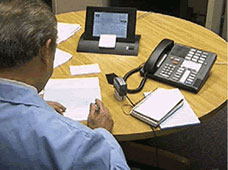The Arizona Department of Corrections is a charter member of the Arizona Telemedicine Program. Today, over 80 percent of specialty medical consultations take place behind prison walls with the specialists located off-site in one of four locations.
 Arizona Department of Corrections (ADC) doctor at the ADC headquarters in Phoenix prepares to interview a prisoner at the prison in Yuma, by telemedicine. The doctor in Phoenix serves as the “gatekeeper” and decides if the prisoner requires the care of a medical specialist. Over 50 percent of requests for services can be met by telemedicine in-house at significant cost savings by reducing the use of outside specialists. Before telemedicine, more patients were unnecessarily referred to specialists.
Arizona Department of Corrections (ADC) doctor at the ADC headquarters in Phoenix prepares to interview a prisoner at the prison in Yuma, by telemedicine. The doctor in Phoenix serves as the “gatekeeper” and decides if the prisoner requires the care of a medical specialist. Over 50 percent of requests for services can be met by telemedicine in-house at significant cost savings by reducing the use of outside specialists. Before telemedicine, more patients were unnecessarily referred to specialists.
St. Mary’s Hospital in Tucson has been a major service provider for the Department of Corrections for over 20 years. Prior to 1997, whenever prisoners needed to be seen by specialists, they were physically transported in vans or buses under tight security to protect public safety. Escapes were a constant concern. Now, St. Mary’s physicians can see the patients by telemedicine without regard to distance. The physicians can listen to heart sounds using the same electronic stethoscopes used in the NASA space program. High-resolution otoscopes are used to look at eardrums. Psychiatric consultations take place by video conferencing. If additional specialists are needed, University Medical Center, in Tucson, and Maricopa Medical Center in Phoenix have additional providers on call. All 10 Arizona rural prisons are linked to the network. Prisoners often prefer to receive their health care services by telemedicine since sick people prefer to avoid being transported. Prisoner grievances concerning their health care have gone down, saving the Department of Corrections legal costs. Over 8,000 prisoner teleconsultations have been completed to date, at a cost savings of over $1,000,000.